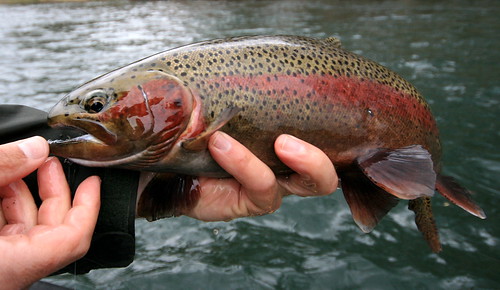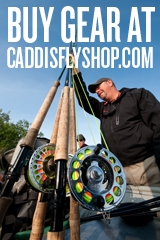For those of you following along with our saga to reduce or remove hatchery trout from the McKenzie River, and to ban bait for trout fishing on the McKenzie, I wanted to provide you with an action sheet — a checklist you can use to see where you can help.
Print this list out, keep it at your desk, and when you start to get mad that your home river isn’t being managed for wild trout, check this list and make sure you’ve done all you can.
1. Get our emails. Sign up for our Trout Unlimited email newsletter. We won’t bug you more than once a month, and it’s an easy way to stay up to date on what’s happening.
2. Take the surveys! Earlier this year we launched a survey asking people if they’d support a bait ban on the McKenzie River. We have 250 responses from people saying they’d like to see that happen, as well as detailed comments. We just launched a second survey asking people if they’d be in favor of reducing or removing hatchery trout from the McKenzie River. These surveys are important for showing ODFW public support for these changes.
3. Get your organizations on board. Local fly fishing clubs are currently debating whether or not to support efforts to protect wild McKenzie River Trout. Let your board members know where you stand. Also, talk to the other conservation organizations you belong to and see if they will help support our efforts. Every organization that can lend a hand — and a voice — will help.
4. Write to our ODFW Commissioners:
Marla Rae
marlarae@qwest.net
The Rae Group
333 High Street NE, Suite 202
Salem, OR 97301
Skip Klarquist
skip@erisalaw.com
Zalutsky & Klarquist, PC
215 SW Washington Street, 3rd Floor
Portland, OR 97204
Zane Smith Jr.
zanegreysmith@msn.com
1243 Delrose Drive
Springfield, OR 97477-1594
Dan Edge
daniel.edge@oregonstate.edu
Department of Fisheries and Wildlife
OSU, 104 Nash Hall
Corvallis, OR 97331-2910
Carter Kerns
503 N Main St.
Pendleton, OR 97801-2243
Jon Englund
jenglund@englundmarine.com
Englund Marine Supply Co, Inc.
PO Box 296
Astoria , OR 97103
Bobby Levy
bobby.levy@my180.net
PO Box 69
Echo, OR 97826
5. Send emails to ODFW officials
Jeff Ziller, South Willamette Watershed District Fish Biologist
jeffrey.s.ziller@state.or.us
Roy Elicker, ODFW Director
Roy.Elicker@state.or.us
Ed Bowles, Fish Division Administrator
Ed.Bowles@state.or.us
Charlie Corrarino, Conservation & Recovery Program Manager
Charles.A.Corrarino@state.or.us
Mark Chilcote, Conservation Biologist
Mark.Chilcote@state.or.us
Rhine Messmer, Recreational Fisheries Program Manager
Rhine.T.Messmer@state.or.us
6. Get political. We could use the support of Oregon legislators. Email your congressman, state representative, or county commissioner and get their position on this issue and make it public.
7. Do your research. We’re currently looking for economic studies from other areas and states to show how much more economic value wild fishery will bring into this area versus hatchery fish. The Deschutes, Metolius — the entire state of Montana — have experienced huge economic benefits by ditching hatchery fish.
8. Look outside the agency. We need support from non-ODFW fishery biologists on this issue. If you or someone you know is a fisheries biologist that feels strongly about McKenzie River wild trout, please speak out.
9. Get writing. Local newspapers, fishing magazines, fly fishing mags, etc. all would welcome opinion pieces on this issue.
10. Go to ODFW commission meetings. Make your voice heard, attend ODFW Commission meetings. The ODFW Commission meeting schedule is here. The process for getting your public testimony heard is here.
If you have any questions or need help coordinating your effort, email mattstansberry@gmail.com.
Thanks for getting involved.
-MS





that’s what i’m talking about…yeah!
Hey guys,
Found this site online and I am amazed that your state guides association is in support of hatchery programs. I don’t know if it will help but the University of Montana has a great resource for finding economic benefits from fishing, hunting and outdoor recreation. They did a study years ago in regards to the price per pound of a trout versus good ole Beef. They found that the trout was many times more per pound due to the amount of money people invest in catching a trout, ie travel, hotel stays, guides, license purchases, dining out and other monies people spend on a fishing vacation. I will try and dig up the study from my old archives in my office.
This may be a great place to get some data to help support management of Wild Trout on the Mckenzie. The University of Montana has a program under their Forestry department called the Institute for Tourism and Recreation. They were the ones who did the study on trout vs beef and should be able to help provide information on the importance of Tourism related to fishing. Here is their website. http://www.itrr.umt.edu/index.html
Good luck with the fight! Wild Trout live longer and grow larger, that in itself should be enough to encourage your guides association.
I have had the good fortune of engaging and fishing the McKenzie River since 1963, I was 10 years old when I first fell in love with this valley. I use to drink water directly out of the river, and always upstream from my trusty canine. I also remember getting wet from all the salmon jumping on both sides of me while wading the river. I used to see Burl Ives trying to stand erect in a riverboat filming the jumping salmon. I used to reliably watch the white water parade. I now live on the river just below McNutt island and have owned property in the McKenzie valley since 1976. Today I feel fortunate to see two bright salmon jump off my shoreline during their cycle in the river, last year I saw one carcass floating downstream, no jumpers.
Here’s what I’ve noticed regarding the section of the river near my home:
After the high water declines, post the winter and spring heavy rain, I generally locate the subsurface holding rocks that the fish use to hold their ground to feed in the current. Reliably, after fish are planted, these holding spots (which I get to know like the back of my hand) are mostly used by planters (where do the natives go when this happens?). Once the planters wash out, some native fish return, but nothing like it was in the spring before the first planters are released.
While we debate the environmental and economic concerns regarding planting trout, here’s something else I’ve noticed living on the river. There are discerning and non-discerning fisherman who float by my place. The non-discerning fisherman, more often than not, pass through my haunts and seem to keep everything they catch. One summer day I saw a stringer of about dozen native fish that a non-discerning fisherman nailed right before my eyes (he was using fresh salmon eggs and found the best spots). When he returned a couple of days later with some of his friends I confronted him about his previous catch and got the basic “none of your business, I’ve fished this river for over blah, blah, blah years, don’t tell me what I can or can’t do”. Through time I’ve become a better judge about when to and when not to talk to the non-discerning fisherman.
Until a decision is made about the fish stocking program, I recommend that discerning fisherman, volunteers and any government employees that are available to assist, man the boat launches and perform a creel census. Consider this, we can educate the public about the fish they have kept. The process can begin as an educational, benign exercise and after a warning or two the infraction becomes a written violation. Ultimately I’ll leave the plan to create a policing process to those who know better than I. Meanwhile I’ll do what I can on my sliver of the river and I’m doing this for the river.
Ultimately with the mix of fish in the river, some people keep everything they catch. I truly believe hands on public education will help our mutual cause while we decide what to do to better manage this robust and beautiful river.
Now if we can get the osprey to follow the rules, that would be something.